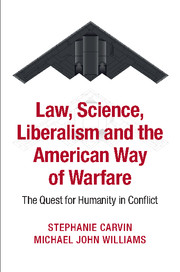Book contents
- Frontmatter
- Contents
- Prologue
- Introduction
- 1 Law and science in the Western way of war
- 2 The American way of war
- 3 Vietnam and the “science” of war
- 4 Immaculate destruction: reorganization, revolution and re-enchantment of War
- 5 Revolution denied: the “war” on terror
- 6 Back to the future?
- Index
- References
3 - Vietnam and the “science” of war
Published online by Cambridge University Press: 05 December 2014
- Frontmatter
- Contents
- Prologue
- Introduction
- 1 Law and science in the Western way of war
- 2 The American way of war
- 3 Vietnam and the “science” of war
- 4 Immaculate destruction: reorganization, revolution and re-enchantment of War
- 5 Revolution denied: the “war” on terror
- 6 Back to the future?
- Index
- References
Summary
All wars and military development should have taught us that … a war, small or large, does not follow a prescribed “scenario” laid out in advance. If we could predict the sequence of events more accurately, we could probably have avoided war in the first place.
Vice Admiral Rickover, 1966, cited in Gibson, The Perfect WarWhen the Nixon Administration took over in 1969 all data on North Vietnam and the United States was fed into a Pentagon computer – populations, gross national product, manufacturing capability, number of tanks, ships, and aircraft, size of the armed forces, and the like. The computer was then asked, “When will we win?” It took only moments to give the answer: “You won in 1964!”
Colonel Harry Summers, “Lessons: A Soldier’s View”America’s war in Vietnam was almost without historical precedent. Aside from the insurgency in the Philippines, the United States had not ever fought a war without any fronts. Although the American military had engaged in several “small wars” over the course of American history, nothing matched the challenge and scope of what was then known as the Vietnam “conflict.” Unlike Britain, the United States had little experience in colonial policing, as these irregular wars were often known. Coming on the heels of Korea, the United States was reluctant to get fully involved in a traditional ground war in Asia. The atomic bomb was briefly considered as a possibility to stop communist expansion in Vietnam, but the Eisenhower Administration ruled out this option since it thought that it would ultimately be counterproductive. This left the United States with limited options. Yet, the Americans felt that something had to be done as the “domino theory,” which held great sway in Washington, argued that the expansion of communism could not be left unchecked.
- Type
- Chapter
- Information
- Law, Science, Liberalism and the American Way of WarfareThe Quest for Humanity in Conflict, pp. 88 - 119Publisher: Cambridge University PressPrint publication year: 2014

